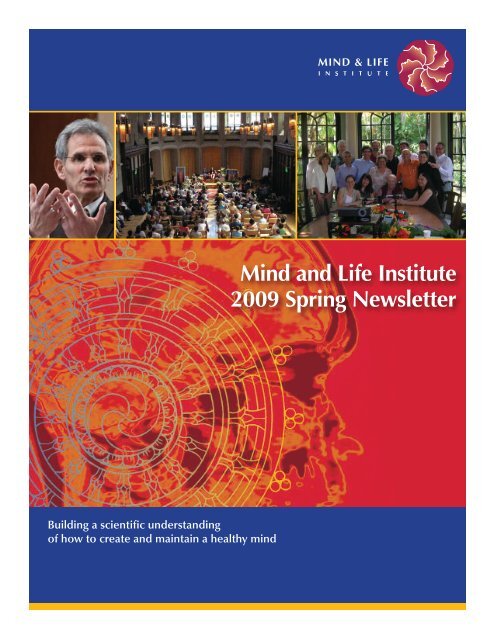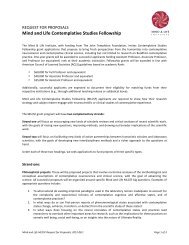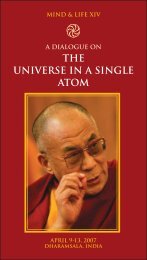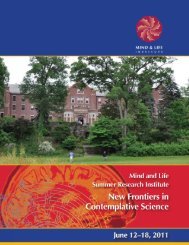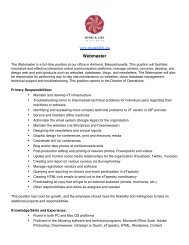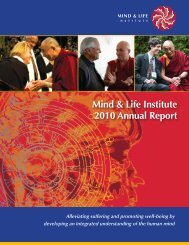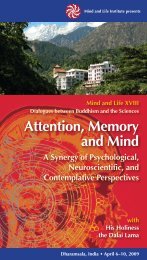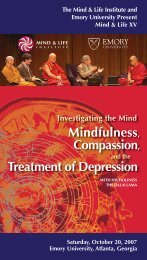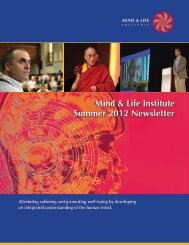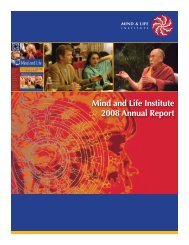Mind and Life Institute 2009 Spring Newsletter - Mind & Life Institute
Mind and Life Institute 2009 Spring Newsletter - Mind & Life Institute
Mind and Life Institute 2009 Spring Newsletter - Mind & Life Institute
You also want an ePaper? Increase the reach of your titles
YUMPU automatically turns print PDFs into web optimized ePapers that Google loves.
Building a scientific underst<strong>and</strong>ing<br />
of how to create <strong>and</strong> maintain a healthy mind<br />
<strong>Mind</strong> <strong>and</strong> <strong>Life</strong> <strong>Institute</strong><br />
<strong>2009</strong> <strong>Spring</strong> <strong>Newsletter</strong>
<strong>Newsletter</strong><br />
<strong>Spring</strong> <strong>2009</strong><br />
Letter from the Chairman<br />
The first quarter of <strong>2009</strong> has been<br />
a very active <strong>and</strong> productive time<br />
for <strong>Mind</strong> <strong>and</strong> <strong>Life</strong>, <strong>and</strong> we expect<br />
the balance of the year to continue<br />
at this active <strong>and</strong> productive rate.<br />
We began the year announcing the<br />
2008 Francisco J. Varela research<br />
awards. You will find the names of<br />
the awardees <strong>and</strong> their research<br />
projects reported in this<br />
newsletter. Please join me in<br />
congratulating these stellar young<br />
scientists who are just beginning<br />
their research careers.<br />
In January we held a private pre meeting to prepare<br />
for our <strong>Mind</strong> <strong>and</strong> <strong>Life</strong> XVIII dialogue with the Dalai<br />
Lama. Before each ML dialogue, all the speakers <strong>and</strong><br />
panelists come together to coordinate <strong>and</strong> refine the<br />
dialogue. Over the years we have learned it is critical<br />
to do this to insure a productive dialogue <strong>and</strong> that our<br />
dialogues improved when we began this process in<br />
1995.<br />
In this newsletter Zara Houshm<strong>and</strong> reports on our<br />
recently completed dialogue in Dharamsala.<br />
Hopefully some of you followed the short snapshots<br />
of the meeting by Rob Roeser <strong>and</strong> David Vago who<br />
contributed daily from Dharamsala on our newly<br />
created blog (www.mind<strong>and</strong>life.org/blog). We expect<br />
to become more proficient in social networking in<br />
the coming months as part of our effort to improve<br />
our communications with our growing circle of<br />
friends around the world who follow <strong>and</strong> support our<br />
work.<br />
In February we held our winter ML Education<br />
Research Network [MLERN] meeting at the lovely<br />
home of our dear friends <strong>and</strong> MLI sponsors, John <strong>and</strong><br />
Tussi Kluge. We have a short tribute to the generosity<br />
of John <strong>and</strong> Tussi in this newsletter following Rob’s<br />
impressions of the MLERN meeting. You will also<br />
find a brief overview of our public dialogue that is<br />
being organized by the MLERN members—<strong>Mind</strong><br />
<strong>and</strong> <strong>Life</strong> XIX dialogue: Educating World Citizens<br />
for the 21st Century– which will be held on October<br />
8-9, <strong>2009</strong> in Washington, DC. This dialogue is open<br />
to the public <strong>and</strong> we hope you will join us for this<br />
historic event. Registrations are now open at<br />
www.EducatingWorldCitizens.org. Please visit that<br />
site today for a full description of that meeting <strong>and</strong> to<br />
register.<br />
Diego Hangartner has written a brief update on the<br />
work we are doing internationally. We are well along<br />
in our planning for our <strong>Mind</strong> <strong>and</strong> <strong>Life</strong> XX dialogue,<br />
also open to the public, in Zurich in April 2010. We<br />
are also planning our first ML dialogue to be held in<br />
India, later in 2010.<br />
We are honored to recognize our growing community<br />
of generous <strong>and</strong> loyal MLI sponsors in this<br />
newsletter. Our work would not be possible without<br />
their support <strong>and</strong> we are pleased to extend our deepest<br />
thanks to the individuals <strong>and</strong> organizations who<br />
sustained us in the past year. We received an extraordinary<br />
gift in 2008 from John <strong>and</strong> Tussi Kluge, who<br />
made an unrestricted donation of $1 million on top of<br />
their strong support of the ML Education Research<br />
Network. This largest single donation in the history of<br />
MLI gives us even greater stability in times of<br />
uncertainty in the global economy. If you share our<br />
passion for bringing science <strong>and</strong> contemplative<br />
wisdom into collaborative dialogue to reduce<br />
suffering in our world, please consider joining our<br />
family of sponsors. You will find several ways of<br />
making gifts to <strong>Mind</strong> <strong>and</strong> <strong>Life</strong> immediately following<br />
the listing of 2008 donors in this newsletter.<br />
Finally, with anxiety <strong>and</strong> stress on the rise<br />
throughout the world in this time of change, we want<br />
to share some inspiring thoughts from our Board<br />
member <strong>and</strong> friend Jon Kabat-Zinn who is the<br />
founding director of the Center for <strong>Mind</strong>fulness in<br />
Medicine, Health Care <strong>and</strong> Society at the University<br />
of Massachusetts Medical School. May his words be<br />
an inspiration to you in keeping your balance during<br />
difficult times.<br />
With warmest regards,<br />
Adam Engle<br />
Chairman <strong>and</strong> CEO<br />
1
<strong>Newsletter</strong><br />
<strong>Spring</strong> <strong>2009</strong><br />
<strong>Mind</strong> <strong>and</strong> <strong>Life</strong> XVIII: Attention, Memory, <strong>and</strong> <strong>Mind</strong>:<br />
A Synergy of Psychological, Neuroscientific, <strong>and</strong> Contemplative Perspectives<br />
The eighteenth <strong>Mind</strong><br />
<strong>and</strong> <strong>Life</strong> conference<br />
brought together<br />
scientists, philosophers,<br />
<strong>and</strong> scholars of<br />
Buddhism for an<br />
extraordinary dialogue<br />
with the Dalai Lama at<br />
his home in<br />
Dharamsala, India on<br />
April 6-10. The topics of <strong>Mind</strong> <strong>and</strong> <strong>Life</strong> XVIII were<br />
human attention, memory, <strong>and</strong> the mind considered<br />
from the phenomenological (including contemplative),<br />
psychological, <strong>and</strong> neurobiological perspectives.<br />
Dialogue participants represented diverse<br />
perspectives from Western science <strong>and</strong> in both<br />
Tibetan <strong>and</strong> Theravada Buddhism traditions. The cocoordinators<br />
of this meeting were David Meyer, a<br />
mathematical psychologist <strong>and</strong> cognitive scientist<br />
from the University of Michigan <strong>and</strong> Alan Wallace,<br />
president of the Santa Barbara <strong>Institute</strong> for<br />
Consciousness Studies <strong>and</strong> a former monk who has<br />
long been involved with the <strong>Mind</strong> <strong>and</strong> <strong>Life</strong> dialogues.<br />
While the relation between attention, memory, <strong>and</strong><br />
consciousness is a fascinating area of research in<br />
psychology <strong>and</strong> neuroscience, it is also a particular<br />
focus of Buddhism. The mental training known as<br />
shamatha aims to develop <strong>and</strong> refine attention, which<br />
then becomes a tool for contemplative insight into the<br />
nature of the mind <strong>and</strong> its relation to the world at<br />
large. The traditional Buddhist study of the mind sees<br />
a close relationship between attention <strong>and</strong> memory:<br />
sustaining attention on a chosen object involves<br />
remembering from moment to moment, returning to<br />
focus whenever the mind w<strong>and</strong>ers away. The close<br />
analysis of attention, memory, <strong>and</strong> mindfulness in<br />
Buddhism has interesting parallels in the scientific<br />
underst<strong>and</strong>ing of attention <strong>and</strong> working memory.<br />
Ground-breaking new research correlates the precise<br />
observations of inner experience from skilled<br />
meditators with advanced brain imaging techniques<br />
for a more complete view of how the mind <strong>and</strong> brain<br />
interact. For instance, in studies of expert meditators<br />
who approach advanced levels of refined attention,<br />
researchers are discovering the extraordinary effects<br />
of a stable attention <strong>and</strong> a calm <strong>and</strong> clear mind on<br />
physical health <strong>and</strong> psychological well-being.<br />
David Meyer introduced models of human<br />
information processing, multitasking <strong>and</strong> their<br />
potential applications for the science of meditation. He<br />
discussed how his work on attention regulation was<br />
informed by insights from cybernetics <strong>and</strong> artificial<br />
intelligence. We now have precise mathematical<br />
models of how the mind can control attention on<br />
multiple tasks through various feedback mechanisms.<br />
Meyer detailed the cognitive neuroscience of attention<br />
<strong>and</strong> multitasking, including the potential dangers <strong>and</strong><br />
inefficiencies of multitasking with an untrained mind.<br />
He then suggested that these models could be<br />
fruitfully applied to the study of mindfulness<br />
meditation, which he viewed as a form of multitasking.<br />
He asked the dialogue partners if meditation<br />
made one better at carrying out multiple tasks or not.<br />
Alan Wallace followed with an overview of how<br />
introspective analysis can be trained through<br />
meditation to a degree of skill that leads to more<br />
accurate <strong>and</strong> reliable self-reporting of mental<br />
experience that may calibrate with the classic thirdperson<br />
methods of the modern laboratory. Such<br />
methods may lead the way for ground-breaking<br />
collaborative research where phenomenology,<br />
Buddhism, <strong>and</strong> cognitive science converge.<br />
Anne Treisman, professor of psychology at Princeton<br />
University, examined different modes of attention.<br />
Focused attention, she suggested, is what “binds” the<br />
various features detected in the brain into a coherent<br />
representation of an object. Distributed attention<br />
gives more of an “average set of features” to objects<br />
because it lacks the precise binding of focused<br />
attention. She also discussed how much of human<br />
perception, motivation <strong>and</strong> self-regulation is nonconscious.<br />
To illustrate this point she described an<br />
experiment in which participants showed greater<br />
selfishness in a post-experiment task after being<br />
tested on another task while sitting in front of a<br />
computer – unconnected with the experiment – in<br />
which a screen-saver displayed dollar bills versus<br />
fish. Dr. Treisman then engaged the contemplatives<br />
in a discussion of processes that may be accessible to<br />
conscious awareness through mental training <strong>and</strong><br />
those that are unlikely to ever be so.<br />
Rupert Gethin, a Buddhist scholar at Bristol<br />
continued on page 3<br />
2
<strong>Newsletter</strong><br />
<strong>Spring</strong> <strong>2009</strong><br />
University <strong>and</strong> president of the highly respected Pali<br />
Text Society, gave a detailed analysis found in ancient<br />
Abhidamma texts of Theravadan Buddhism—the<br />
earliest records of Buddhist psychology—of the many<br />
mental processes related to attention <strong>and</strong> memory that<br />
interplay simultaneously, moment by moment, to<br />
create our experience of the world. The Theravada<br />
perspective on mindfulness <strong>and</strong> the mental factors<br />
associated with it seemed to hold a special interest for<br />
the Dalai Lama <strong>and</strong> the senior Tibetan monks in<br />
attendance, <strong>and</strong> we witnessed an extraordinary<br />
session of Buddhist ‘shop talk’ among true experts.<br />
Their discussion of attention (manasikara),<br />
mindfulness (sati), <strong>and</strong> clear comprehension<br />
(samapajañña) afforded a glimpse into the diversity<br />
<strong>and</strong> subtlety of Buddhist thought with a precision that<br />
the scientists especially could appreciate.<br />
Adele Diamond, Professor of Developmental<br />
Cognitive Neuroscience at the University of British<br />
Columbia, combines developmental, cognitive,<br />
neuroscientific <strong>and</strong> molecular genetic approaches in<br />
her work on cognitive control processes that rely on<br />
the prefrontal cortex, focusing on attention regulation<br />
<strong>and</strong> working memory. Her research has shown that<br />
children are very different from adults in their ability<br />
to regulate attention <strong>and</strong> control pre-potent impulses,<br />
<strong>and</strong> that these abilities can be learned to provide a<br />
stable foundation for academic learning. Dr.<br />
Diamond highlighted the close intertwining of motor<br />
<strong>and</strong> cognitive development at the brain <strong>and</strong> mental<br />
levels. She noted that developmentally appropriate<br />
means of teaching attention control can include<br />
physical activities as well as more introverted ones<br />
which are difficult for young children. Very practical<br />
techniques apply this new underst<strong>and</strong>ing in creative<br />
programs for better success in the classroom. The<br />
role of play, the arts, <strong>and</strong> physical education are<br />
essential in developing children’s skills of attention<br />
<strong>and</strong> self-regulation, as she showed in powerfully<br />
moving video demonstrations.<br />
Amishi Jha, Assistant Professor of Psychology at the<br />
University of Pennsylvania’s Center for Cognitive<br />
Neuroscience, reported on new research using<br />
mindfulness training to improve attention <strong>and</strong> working<br />
memory among medical students <strong>and</strong> other populations<br />
including older adults. Working memory capacity is<br />
fragile, affected by arousal <strong>and</strong> dem<strong>and</strong>, <strong>and</strong> it<br />
degrades with age. <strong>Mind</strong>fulness training has been<br />
shown to improve both attention <strong>and</strong> working memory<br />
within just weeks of dedicated practice, improving the<br />
practitioner’s ability to cope with increased dem<strong>and</strong> on<br />
each system <strong>and</strong> sustained over time.<br />
Emotion has evolved to play a crucial role in<br />
controlling attention for survival <strong>and</strong> adaptation by<br />
capturing attention, setting priorities, enhancing<br />
memory, <strong>and</strong> exaggerating our confidence in the<br />
accuracy of memories. Elizabeth Phelps, Professor of<br />
Psychology <strong>and</strong> Neural Science at New York<br />
University, explores the neurobiological interfaces<br />
between emotion, attention, <strong>and</strong> memory that explain<br />
these effects.<br />
The interplay between emotion <strong>and</strong> attention holds<br />
special interest for the collaboration between<br />
researchers <strong>and</strong> contemplatives, as Buddhist meditation<br />
often involves complementary approaches to training<br />
both emotional <strong>and</strong> attentional skills. The Shamatha<br />
Project is an ambitious study of the effects of longterm<br />
meditation training, combining focused attention<br />
with contemplative training in compassion <strong>and</strong> related<br />
emotions. Clifford Saron, a researcher at the Center for<br />
<strong>Mind</strong> <strong>and</strong> Brain at UC Davis <strong>and</strong> principal investigator<br />
on the project, presented preliminary findings,<br />
including significant health effects of meditation that<br />
have not been studied before. The audience in<br />
Dharamsala was privileged to get a first glimpse of<br />
exciting new data on a fast track for publication that<br />
will have a major impact on the field.<br />
Finally, Shaun Gallagher, Professor of Philosophy <strong>and</strong><br />
Cognitive Science at the University of Hertfordshire<br />
<strong>and</strong> the University of Central Florida, highlighted the<br />
need to look beyond the brain to a vision of human<br />
consciousness as integrally intertwined with the body<br />
<strong>and</strong> the other people who inhabit our social worlds. He<br />
described studies that show how sensory perception is<br />
deeply informed by bodily aspects such as posture <strong>and</strong><br />
movement, <strong>and</strong> intersubjective social interactions are<br />
vital to the construction of our consciousness. His<br />
contribution served to remind us that phenomenology,<br />
which was so important in <strong>Mind</strong> <strong>and</strong> <strong>Life</strong> founder<br />
Francisco Varela’s work, brings a nuanced view that is<br />
not limited to the discussion of first-person<br />
observation in scientific research.<br />
<strong>Mind</strong> <strong>and</strong> <strong>Life</strong> staff <strong>and</strong> participants blogged from<br />
the meeting site <strong>and</strong> have continued a wider dialogue<br />
with interested readers. Blog posts, images <strong>and</strong><br />
videos from the dialogue can be found at<br />
www.mind<strong>and</strong>life.org/blog.<br />
3
<strong>Newsletter</strong><br />
<strong>Spring</strong> <strong>2009</strong><br />
MLI announces the 2008–09<br />
Francisco J. Varela Research Award grant recipients<br />
After a rigorous review <strong>and</strong> selection process, we are pleased to announce the<br />
awarding of this year’s Francisco J. Varela Research Grants. This grant<br />
program was established in 2004 to honor the memory of MLI co-founder<br />
Francisco Varela by stimulating high-quality research on pressing questions in<br />
contemplative science. To date 61 awards have been made totaling over<br />
$750,000 in funding for research fellows who have attended a <strong>Mind</strong> <strong>and</strong> <strong>Life</strong><br />
Summer Research <strong>Institute</strong> <strong>and</strong> submitted proposals for this competitive grants<br />
program. Varela awardees have published significant findings in top-tier, peerreviewed<br />
journals <strong>and</strong> have been instrumental in advancing our knowledge in the<br />
emerging field of contemplative science. Please join us in congratulating these<br />
researchers on their success.<br />
2008-09 Francisco J. Varela Research Awardees <strong>and</strong> their projects<br />
Brooke Dodson-Lavelle, M.A. – Study to design <strong>and</strong><br />
assess the validity of the emory meditation<br />
practice tradition & experience (EMPTE) scale<br />
Aviva Berkovich-Ohana, M.Sc. – Meditation <strong>and</strong> nonlinear<br />
neurodynamics: from state to trait<br />
Julie Brefczynski-Lewis, Ph.D. – Changing our<br />
perception of others through compassion<br />
meditation<br />
Lisa Flook, Ph.D. & Brian Galla, M.A. – <strong>Mind</strong>ful<br />
Awareness Practices for Preschool Children to<br />
Improve Attention <strong>and</strong> Emotion Regulation<br />
Sheila Garl<strong>and</strong>, Ph.D. – An objective comparison of<br />
cognitive behavioral therapy <strong>and</strong> mindfulnessbased<br />
stress reduction for the treatment of<br />
insomnia in individuals with cancer using wrist<br />
actigraphy: A r<strong>and</strong>omized non-inferiority trial<br />
Wendy Hasenkamp, Ph.D. - Real Time Dynamics of<br />
Cognitive Processing during Meditation: A<br />
Subject-driven fMRI Investigation<br />
Br<strong>and</strong>on King, B.A. & Anthony Zanesco, B.A. - The<br />
Interrelationship Between Cognitive Control <strong>and</strong><br />
Affect in an Intensive Vipassana Retreat<br />
Teresa Sivilli, B.A. - The FACE Study: Faces,<br />
Attention, Compassion <strong>and</strong> Emotion<br />
Nicholas Van Dam, Ph.D. – Exploring the impact of<br />
meditation on stress <strong>and</strong> psychopathology:<br />
Attentional allocation as a potential mechanism<br />
of active change following meditation training<br />
Lepp, Nathaniel, B.S./Ellen Darling, B.A. – Schoolbased<br />
mindfulness training in middle school <strong>and</strong><br />
college students: Effects on emotion, objectively<br />
measured sleep <strong>and</strong> attention; Effects on<br />
mindfulness, self-compassion <strong>and</strong> depression in<br />
women<br />
Susanne Leiberg, Ph.D. – The neural <strong>and</strong> behavioural<br />
correlates of a neurofeedback-based metta<br />
meditation training<br />
Sean Barnes, M.S. – Identifying the mechanisms of<br />
action in mindfulness-based cognitive therapy<br />
Holly Rau, B.S. – Application of the neurovisceral<br />
integration model to mindfulness: Implications<br />
for stress regulation <strong>and</strong> the development of<br />
insomnia<br />
The Francisco J. Varela Research Awards are supported by grants from the Hershey Family Foundation<br />
<strong>and</strong> the John Templeton Foundation.<br />
4
<strong>Newsletter</strong><br />
<strong>Spring</strong> <strong>2009</strong><br />
<strong>Mind</strong> <strong>and</strong> <strong>Life</strong> Education Research Network (MLERN) Meeting February <strong>2009</strong><br />
The <strong>Mind</strong> <strong>and</strong> <strong>Life</strong> Education Research<br />
Network (MLERN) was formed in 2006<br />
to create a multidisciplinary intellectual<br />
forum dedicated to exploring issues at<br />
the intersection of mind, brain,<br />
education <strong>and</strong> contemplative practice.<br />
The network, directed by Dr. Richard<br />
Davidson of the University of<br />
Wisconsin, includes a core group of<br />
contemplatives <strong>and</strong> contemplative<br />
scholars; neuroscientists; cognitive,<br />
developmental <strong>and</strong> educational<br />
scientists, <strong>and</strong> educational activists.<br />
MLERN Group at the home of Tussie <strong>and</strong> John Kluge, West Palm Beach Florida.<br />
The most recent meeting took place at the home of<br />
MLERN’s primary benefactors, Tussi <strong>and</strong> John<br />
Kluge, in West Palm Beach Florida. Needless to<br />
say, the sunshine <strong>and</strong> ocean were omnipresent<br />
blessings in this setting! This was the last formal<br />
meeting of the first phase of the Network.<br />
The meeting began with a reflection on what the<br />
network had accomplished in its first three-year<br />
phase. Richie Davidson, the network’s director, noted<br />
“We’ve brought in a tremendous number of<br />
educators, scientific experts <strong>and</strong> contemplatives over<br />
these years, a very rich array. It seems there is a<br />
range of things out there in the country at this time<br />
<strong>and</strong> my impression is that, although people are<br />
extremely well-intentioned <strong>and</strong> likely benefitting<br />
kids <strong>and</strong> teachers, there’s precious little research,<br />
especially regarding the application of contemplative<br />
practices to children. That’s the bottom line honest<br />
truth about the state of the art. Launching scientific<br />
research in the area will allow these interventions to<br />
be scaled up <strong>and</strong> that is critical as it is our aspiration<br />
to transform the world. We’re going to need to have<br />
this be evidenced-based in a way that can influence<br />
policy makers <strong>and</strong> the world at large.”<br />
In response to these realities, Dr. Davidson also<br />
noted that the network had funded three pilot<br />
research projects to date: Amishi Jha was funded to<br />
develop age appropriate attention <strong>and</strong> working<br />
memory tasks for school-aged children that could be<br />
used in studies of education <strong>and</strong> contemplative<br />
practice; Mark Greenberg <strong>and</strong> Tamar Mendelson<br />
were funded to do pilot research in inner-city<br />
Baltimore to look at the effects of a mindfulness<br />
based yoga program on 4 th <strong>and</strong> 5 th grade, primarily<br />
African-American students; <strong>and</strong> Rob Roeser <strong>and</strong><br />
Kim Schonert-Reichl were funded to do a study of a<br />
mindfulness-based teacher professional development<br />
program for stress reduction <strong>and</strong> resilience in the city<br />
of Vancouver, British Columbia, Canada. He also<br />
noted that many of these studies were aimed at<br />
developing measures of calm, clear, <strong>and</strong> kind<br />
individuals of different ages for use in future contemplative<br />
research.<br />
In addition to this funded research, the MLERN<br />
group discussed the next phase of the network <strong>and</strong> its<br />
aims. One of the main goals of MLERN II is to<br />
conduct an interdisciplinary, collaborative multisite<br />
study of contemplative practices with teachers <strong>and</strong><br />
students. Efforts to develop grant money to fund this<br />
research are underway. The group also took time to<br />
work on a “whitepaper” on Contemplative<br />
Education. In this case, the whitepaper is a collaborative<br />
work of network members aimed at defining<br />
this domain of education <strong>and</strong> focusing on how extant<br />
research on basic human developmental processes,<br />
<strong>and</strong> the development of contemplative adepts, both<br />
support the viability of further investigation of the<br />
use of contemplative practices with children <strong>and</strong><br />
adolescents <strong>and</strong> their parents <strong>and</strong> teachers.<br />
MLERN also continued the tradition of inviting wellknown<br />
scholars in the areas of education, science,<br />
continued on page 6<br />
5
<strong>Newsletter</strong><br />
<strong>Spring</strong> <strong>2009</strong><br />
MLERN meeting, continued from page 5<br />
<strong>and</strong> contemplative practice in to present their ideas <strong>and</strong><br />
research. Guests included Bridget Hamre, Kim Schoert-<br />
Reichl, Terry Chadsey, Terry Meersman <strong>and</strong> Trish Broderick.<br />
These presenters talked about how to assess classroom<br />
environments that were socially <strong>and</strong> emotionally conducive to<br />
learning; how a mindfulness education program for<br />
elementary school children in Vancouver seemed to show<br />
positive effects across an array of attentional <strong>and</strong> stressrelated<br />
measures; <strong>and</strong> on how mindfulness-based stress<br />
reduction can reduce rumination in adolescent females. We<br />
also heard about work on teacher preparation <strong>and</strong> were shown<br />
new materials for parent education that might include a<br />
mindfulness component in the future. In addition, the meeting<br />
included rich discussions among the other members present<br />
including Mark Greenberg, Linda Lantieri, Adam Engle,<br />
Roshi Joan Halifax, Richie Davidson, Kim Schonert-Reichl,<br />
David Vago, Thupten Jinpa, Tish Jennings, Tussi Kluge, Trish<br />
Broderick, Heather Locke <strong>and</strong> Rob Roeser.<br />
The members of the Network <strong>and</strong> the <strong>Mind</strong> <strong>and</strong> <strong>Life</strong> <strong>Institute</strong><br />
would like to express our sincere gratitude to Tussi <strong>and</strong> John<br />
Kluge for their hospitality in hosting several MLERN<br />
meetings, <strong>and</strong> for their generosity in supporting the network<br />
<strong>and</strong> its aims.<br />
John <strong>and</strong> Tussi<br />
<strong>Mind</strong> <strong>and</strong> <strong>Life</strong> Board member<br />
Richie Davidson sat down with<br />
Tussi Kluge at the February, <strong>2009</strong><br />
<strong>Mind</strong> <strong>and</strong> <strong>Life</strong> Education<br />
Research Network (MLERN)<br />
meeting held at her Florida<br />
home. Tussi <strong>and</strong> John Kluge<br />
have been strong supporters of<br />
MLERN <strong>and</strong> recently made the<br />
largest single gift to MLI in its<br />
history.<br />
Richie: Tussi, thank you for your strong support of the <strong>Mind</strong><br />
<strong>and</strong> <strong>Life</strong> <strong>Institute</strong> <strong>and</strong> of the MLERN program in particular. Can<br />
I ask you to share with us your vision of the role of philanthropy<br />
in our society?<br />
Tussi: I think that philanthropy is a wonderful way of<br />
encouraging people to go into deeper knowledge of an organization<br />
or cause they support. Individuals have an opportunity<br />
to be early supporters of new ideas that may later be<br />
supported more broadly – by institutions <strong>and</strong> public funds, for<br />
instance. Philanthropy can be most powerful when it focuses<br />
on nourishing new ideas <strong>and</strong> solutions, almost in the way a<br />
collector of art looks for the next big artist before they get<br />
famous.<br />
RD: What do you find most appealing about MLI’s mission<br />
<strong>and</strong> the work we are doing?<br />
TK: <strong>Mind</strong> <strong>and</strong> <strong>Life</strong> collects deep knowledge, deep heart <strong>and</strong><br />
insights <strong>and</strong> seeks to apply it in novel ways that can transform<br />
society <strong>and</strong> individuals for the better. It is so beautiful that<br />
<strong>Mind</strong> <strong>and</strong> <strong>Life</strong> began in the deep heart of a neuroscientist<br />
(Francisco Varela) who was so much more than a scientist. His<br />
vision was more like that of a renaissance man. While fully<br />
present in the modern world of technology <strong>and</strong> science, he<br />
also cherished <strong>and</strong> kept alive so many of the ancestral <strong>and</strong><br />
original things that contemplative wisdom holds. I find it<br />
beautiful that <strong>Mind</strong> <strong>and</strong> <strong>Life</strong> strives to be true to that vision of<br />
working at the intersection of ancient wisdom <strong>and</strong> modern<br />
science.<br />
RD: You <strong>and</strong> John have been strong supporters of <strong>Mind</strong> <strong>and</strong><br />
<strong>Life</strong>’s Education Research Network from the very start. Now<br />
that it is preparing for a second phase can you say a few words<br />
about your hopes <strong>and</strong> dreams for the role contemplative<br />
practices might come to play in our education system?<br />
TK: It is both amazing <strong>and</strong> appalling when you see that we<br />
pay a teacher half what a prison guard gets paid. It says<br />
something about our priorities. We have to turn society<br />
around, <strong>and</strong> I hope that <strong>Mind</strong> <strong>and</strong> <strong>Life</strong> can play a part in that.<br />
Apart from the salary issue, it is also one of respect <strong>and</strong> what<br />
we value for our future. If we can help restore the respect for<br />
teachers <strong>and</strong> others who help preserve <strong>and</strong> promote human,<br />
kind <strong>and</strong> compassionate behavior that would be truly<br />
amazing. The work of MLERN is all about fostering qualities<br />
of kindness, compassion, resilience <strong>and</strong> attention in children<br />
so they will be well-rounded <strong>and</strong> complete individuals <strong>and</strong><br />
members of society. What a beautiful objective!<br />
RD: We are going through challenging <strong>and</strong> stressful times right<br />
now. What do you do to keep your balance in these uncertain<br />
times?<br />
TK: The main thing is not to be too hard on yourself. If I can<br />
remain somewhat of an observer of my own actions <strong>and</strong><br />
mistakes I can work to shift them into positive steps <strong>and</strong> learn<br />
from them, rather than react in unhealthy ways to them. I also<br />
am constantly renewed by laughter <strong>and</strong> joy, so I try to make<br />
space to let that into my life regularly. The ability to be<br />
physically aware comes with discipline <strong>and</strong> I find it much<br />
easier when I teach it. When we teach something to others we<br />
are more involved, accountable <strong>and</strong> responsible for them, in a<br />
way. We enter into a deeper relationship together, at least I<br />
do. That’s one of the things I like most about the way MLERN<br />
is developing: it is putting a lot of attention on the role<br />
teachers play in creating the right conditions for their students.<br />
RD: Let me just close by thanking John <strong>and</strong> you on behalf of<br />
the entire Board <strong>and</strong> staff for your strong support of <strong>Mind</strong> <strong>and</strong><br />
<strong>Life</strong> <strong>and</strong> MLERN.<br />
TK: Thank you, Richie!<br />
6
<strong>Newsletter</strong><br />
<strong>Spring</strong> <strong>2009</strong><br />
<strong>Mind</strong> <strong>and</strong> <strong>Life</strong> International:<br />
Exp<strong>and</strong>ing Opportunities for Collaboration<br />
<strong>Mind</strong> <strong>and</strong> <strong>Life</strong> International was founded in January<br />
2008 as an Association in Zurich. The goal is to<br />
catalyze <strong>Mind</strong> <strong>and</strong> <strong>Life</strong>’s presence <strong>and</strong> activities in<br />
Europe <strong>and</strong> beyond, recognizing that the potential for<br />
collaboration between contemplative <strong>and</strong> scientific<br />
knowledge <strong>and</strong> wisdom knows no geographic<br />
bounds. ML International is a tax-exempt organization.<br />
Diego Hangartner is the General Secretary.<br />
The first event organized by <strong>Mind</strong> <strong>and</strong> <strong>Life</strong> International<br />
was the <strong>Mind</strong> <strong>and</strong> <strong>Life</strong> meeting in Berlin,<br />
which was planned to be the 18th meeting with His<br />
Holiness the Dalai Lama. It would have taken place<br />
from Thursday, October 16 to Sunday, October 19,<br />
2006; the topic set was “The Self, Mental Causation<br />
<strong>and</strong> Free Will.” Unfortunately, on September 13, His<br />
Holiness cancelled his travels to Europe on His<br />
physician’s advice, <strong>and</strong> preparations came to a halt<br />
shortly before the event would have taken place.<br />
At present, we are preparing the next conference in<br />
Europe: <strong>Mind</strong> <strong>and</strong> <strong>Life</strong> XX “On Altruism <strong>and</strong><br />
Compassion in Economic Systems” in Zurich, April<br />
2010. This will be a public conference. The goal of<br />
this meeting is to hold a high level, interdisciplinary<br />
dialogue with experts in the fields of Buddhism,<br />
neuroscience, psychology <strong>and</strong> economics. Participants<br />
will share their perspectives on empathy,<br />
compassion <strong>and</strong> pro-social motivation, discussing the<br />
relevance of empathy <strong>and</strong> compassion for the transformation<br />
of the individual <strong>and</strong> of large-scale social<br />
systems (eg, economic, political, etc.) Given the<br />
current turmoil in the global economy, this is a<br />
particularly appropriate topic for a <strong>Mind</strong> <strong>and</strong> <strong>Life</strong><br />
dialogue.<br />
His Holiness <strong>and</strong> eminent scientists will discuss<br />
central issues <strong>and</strong> questions such as:<br />
• How do the concepts of altruism, egoism, empathy<br />
<strong>and</strong> compassion in Buddhist Philosophy relate to<br />
similar concepts in the emerging fields of ‘social<br />
neuroscience’ <strong>and</strong> ‘neuroeconomics’ <strong>and</strong> to<br />
research on empathy, altruism, fairness, economic<br />
decision-making <strong>and</strong> cooperation?<br />
• Can compassion <strong>and</strong> pro-social motivation<br />
influence economic decision-making? If so, how?<br />
• How can a competitive system such as our modern<br />
economic system be conceived <strong>and</strong> constructed in<br />
such a way that compassionate motives <strong>and</strong><br />
altruism play a larger role?<br />
A bit farther into the future we are organizing our<br />
first <strong>Mind</strong> <strong>and</strong> <strong>Life</strong> dialogue in India, scheduled for<br />
Delhi in late 2010. With this dialogue we will<br />
exp<strong>and</strong> our outreach to the scientific <strong>and</strong> contemplative<br />
communities in India <strong>and</strong> Asia. The planning<br />
committees for both dialogues are in the early stages<br />
of preparatory work <strong>and</strong> have not yet begun<br />
soliciting participants for either meeting.<br />
In addition to organizing these conferences, <strong>Mind</strong><br />
<strong>and</strong> <strong>Life</strong> International is investigating the possibility<br />
of setting up a European arm of the very successful<br />
<strong>Mind</strong> <strong>and</strong> <strong>Life</strong> Summer Research <strong>Institute</strong>. Interest<br />
is growing for this type of gathering outside the<br />
United States <strong>and</strong> the current MLSRI is heavily<br />
subscribed. We are looking into locating an<br />
appropriate venue <strong>and</strong> raising funds to support this<br />
effort.<br />
7
<strong>Newsletter</strong><br />
<strong>Spring</strong> <strong>2009</strong><br />
<strong>Mind</strong> <strong>and</strong> <strong>Life</strong> XIX:<br />
Educating World Citizens for the 21 st Century<br />
How can our educational system evolve to meet the<br />
challenges of the 21st century?<br />
How will we educate people to be compassionate,<br />
competent, ethical <strong>and</strong> engaged in an increasingly<br />
complex <strong>and</strong> interconnected world?<br />
These questions are at the heart of Educating World<br />
Citizens for the 21 st Century, a two-day education<br />
dialogue bringing together His Holiness the Dalai<br />
Lama with leading educators, scientists <strong>and</strong> contemplatives.<br />
The dialogue will take place at DAR Constitution<br />
Hall in Washington, D.C., October 8–9, <strong>2009</strong>.<br />
This interdisciplinary dialogue will pool new ideas in<br />
educational theory <strong>and</strong> practice, philosophy,<br />
psychology, <strong>and</strong> neuroscience with the wisdom of the<br />
world’s great contemplative traditions. The intent of<br />
the conference is to create a synergy of these<br />
converging disciplines to inspire a new vision of<br />
education that focuses on the development of the<br />
whole child <strong>and</strong> adolescent within more caring <strong>and</strong><br />
effective schools <strong>and</strong> communities. Presenters will<br />
address how to create an educational system that will<br />
nurture the heart as well as the mind <strong>and</strong> that will<br />
create compassionate, engaged, <strong>and</strong> ethical world<br />
citizens whose skills <strong>and</strong> abilities are used not only for<br />
personal growth <strong>and</strong> advancement, but also for the<br />
good of the world.<br />
The conference is co-sponsored by Harvard<br />
University School of Education, Stanford University<br />
School of Education, University of Virginia Curry<br />
School of Education, Pennsylvania State University<br />
College of Education, University of Wisconsin-<br />
Madison School of Education, American Psychological<br />
Association, <strong>and</strong> the Collaboration for<br />
Academic, Social <strong>and</strong> Emotional Learning (CASEL).<br />
Major speakers will include His Holiness the Dalai<br />
Lama, Marian Wright Edelman (Children’s Defense<br />
Fund), Richard J. Davidson (University of Wisconsin<br />
– Madison), <strong>and</strong> Linda Lantieri (Inner Resilience<br />
Program). Moderators / Interpreters include Daniel<br />
Goleman, Joan Halifax, <strong>and</strong> Thupten Jinpa. The Dalai<br />
Lama will participate fully in all sessions.<br />
The panelists scheduled to appear include:<br />
Peter Benson<br />
Martin Brokenleg<br />
Ronald Dahl<br />
Linda Darling-<br />
Hammond<br />
Nancy Eisenberg<br />
Mark Greenberg<br />
Takao Hensch<br />
Ann Carolyn Klein<br />
Kathleen McCartney<br />
Nel Noddings<br />
Matthieu Ricard<br />
Lee Shuman<br />
Margot Stern Strom<br />
“In recent years we have seen evidence that contemplative<br />
practices can improve attention, emotional<br />
balance, kindness, compassion <strong>and</strong> confidence among<br />
adults who use them,” said Adam Engle, Chairman of<br />
the <strong>Mind</strong> <strong>and</strong> <strong>Life</strong> <strong>Institute</strong>. “This dialogue among<br />
the Dalai Lama, world-renowned educators, scientists<br />
<strong>and</strong> policy makers will explore in a public setting<br />
whether it is possible to bring these benefits to<br />
children earlier in their lives, especially in the context<br />
of our educational systems.”<br />
Registration is now open to the general public <strong>and</strong> we<br />
expect dem<strong>and</strong> for seats to be strong for this<br />
stimulating two-day dialogue. You can find additional<br />
information on the program <strong>and</strong> register for the<br />
conference at www.educatingworldcitizens.org. You<br />
will also find information on accommodations <strong>and</strong><br />
VIP sponsorship packages.<br />
8
<strong>Newsletter</strong><br />
<strong>Spring</strong> <strong>2009</strong><br />
2008 Donor Recognition Report<br />
We are extremely grateful for the generous support of our donors in 2008. <strong>Mind</strong> <strong>and</strong> <strong>Life</strong> depends on the<br />
charitable contributions of individuals <strong>and</strong> foundations in order to fulfill our mission. Please join us in<br />
thanking all those whose gifts sustain our progress.<br />
This listing covers grants <strong>and</strong> contributions received from January 1 through December 31, 2008.<br />
$1,000,000 <strong>and</strong> up<br />
John <strong>and</strong> Tussi M. Kluge<br />
$100,000 <strong>and</strong> up<br />
Peter & Alison Baumann<br />
Ann M. Down<br />
The Hershey Family Foundation<br />
The John Templeton Foundation<br />
$50,000 <strong>and</strong> up<br />
Grant Couch & Louise Pearson<br />
Beat & Regula Curti<br />
Rip & Jacque Gellein<br />
The George Family Foundation<br />
The William James Foundation<br />
The Lost<strong>and</strong> Foundation<br />
Delphine & Jean-Paul<br />
Resseguier<br />
$20,000 <strong>and</strong> up<br />
The MCJ Amelior Foundation<br />
Anonymous<br />
Klaus Hebben<br />
Ralph & Kathy Robinson<br />
The Tan Teo Charitable<br />
Foundation<br />
The Walker Family Foundation<br />
$10,000 <strong>and</strong> up<br />
The Sager Family<br />
Foundation/Science Workshop<br />
for Monks<br />
The Shapiro Family Foundation<br />
The Adam J. Weissman<br />
Foundation<br />
$5,000 <strong>and</strong> up<br />
Victor & Roberta Bradford<br />
Olivia Hansen<br />
Greg Jacobson<br />
Fran & Tim Orrok<br />
Daniel & Ursula Vollenweider<br />
The Joni Winston Fund<br />
$1,000 <strong>and</strong> up<br />
Anonymous<br />
Raluca Moucha<br />
Ian Paul & Lara Patriquin<br />
Bradley Richards•<br />
Roy & Gita Steinbock<br />
Gifts up to $999<br />
Doris Berlin†<br />
Patricia Buchanan<br />
Ms. George Campling<br />
Ed Cutrell & Paige Bills•<br />
Karina Fedko<br />
Robert Halcomb<br />
Wendy Hasenkamp<br />
Shari Herrick<br />
Cecile Hohenlohe<br />
Charles-Antoine Janssen<br />
Feng-Yang Kuo<br />
Russ Langdon<br />
Sara Lazar<br />
Microsoft Matching Gifts<br />
Program<br />
Antonio Pinon<br />
Michael Popper<br />
Johannes Prins<br />
Erika Rosenberg<br />
Karen & Tony Samples†<br />
Lauren Selig<br />
Adeline Van Waning<br />
Deirdre G. Weliky†<br />
† In memory of Herman Parker<br />
• Gifts matched by employer<br />
We invite you to support our efforts to bring science <strong>and</strong> contemplative wisdom into dialogue <strong>and</strong> collaboration<br />
to build an underst<strong>and</strong>ing of how to create <strong>and</strong> maintain a healthy mind. Contributions may be made via our<br />
secure, online web page https://app.etapestry.com/hosted/<strong>Mind</strong><strong>and</strong><strong>Life</strong><strong>Institute</strong>/OnlineGiving.html or by mail to:<br />
<strong>Mind</strong> <strong>and</strong> <strong>Life</strong> <strong>Institute</strong>, 7007 Winchester Circle, Suite 100 Boulder, CO 80301.<br />
For information concerning wire transfers or the gift of securities please contact our Director of Development,<br />
Jim McMillan at jfmcmillan@mind<strong>and</strong>life.org, (303) 530-1940.<br />
If you have made provisions for <strong>Mind</strong> <strong>and</strong> <strong>Life</strong> in your will, please let us know so we may acknowledge your<br />
consideration in our next donor report.<br />
9
<strong>Newsletter</strong><br />
<strong>Spring</strong> <strong>2009</strong><br />
Overwhelmed<br />
Excerpted by permission from Coming to Our Senses<br />
©2005 by Jon Kabat-Zinn, Ph.D.<br />
One day, I had a phone conversation with<br />
a professor of religion prior to a visit to<br />
his campus to meet with a faculty group<br />
about developing a contemplative<br />
curriculum in the university for undergraduates.<br />
In the course of the conversation,<br />
he told me that he was extraordinarily busy, what with<br />
all his committee responsibilities on top of his teaching <strong>and</strong><br />
scholarship, travel, <strong>and</strong> raising young children at home.<br />
For some reason, my first reaction was to laugh <strong>and</strong> tease him<br />
a bit about it. Then I realized that it wasn’t so funny, certainly<br />
not for him. It was diagnostic, a telltale sign of our age, <strong>and</strong> I<br />
found myself feeling sad, <strong>and</strong> a little disappointed. Somehow,<br />
deep in the recesses of my psyche, I had been harboring an<br />
archetype of the Ivy League professor, especially an oriental<br />
scholar <strong>and</strong> longtime meditation practitioner, leading a quiet<br />
<strong>and</strong> peaceful life on an idyllic campus. I shared with him that<br />
if he were talking about the medical school, or the law<br />
school, or the business school, or even the biology<br />
department, I wouldn’t have been at all surprised. But the<br />
religion department! The humanities!?<br />
In saying it, I realized how compartmentalized my own mind<br />
was. There was still a romantic memory trace of a former<br />
time, perhaps when I was in college in the early sixties, when<br />
things really seemed slow <strong>and</strong> leisurely, with life unfolding<br />
on a more human scale <strong>and</strong> at a rate that wasn’t conducive to<br />
a sense of perpetual overwhelm. Of course, that is, leaving<br />
out the violence of segregation in the South, the Cuban<br />
missile crisis, <strong>and</strong> the lie, but even the missile crisis seemed<br />
to unfold in slow motion, trapped as we were into being<br />
helpless spectators at what could have turned into “the end of<br />
the world.”<br />
Now though, our inner, first-person experience of things<br />
happening is so speeded up that we hardly know what is<br />
happening to us or around us, either individually or collectively.<br />
Like the proverbial frog put into water <strong>and</strong> then<br />
gradually heated, we often don’t realize how fast <strong>and</strong> furious<br />
<strong>and</strong> hot things have become for us until we experience that<br />
we are already getting scalded; or, in the frog’s case, dead<br />
without having attempted to leap out, as he would have, they<br />
say, if dropped into hot water to begin with. Speed itself has<br />
snuck up on us. It has gradually become a way of life we are<br />
now addicted to <strong>and</strong> complacent with without even knowing<br />
it. We have been entrained into what is now perpetual acceleration,<br />
with ever increasing expectations to get more done<br />
sooner, to process endless amounts of information, both the<br />
desirable <strong>and</strong> that which we are merely bombarded by, to be<br />
instantly gratified, even if it is just by the speed at which our<br />
computer boots up in the morning, if we ever shut it off, or by<br />
how fast we can get on the Internet. As we have seen <strong>and</strong><br />
know deep in our hearts, we are running so fast to keep up<br />
with our schedules <strong>and</strong> to get things done <strong>and</strong> to acquire what<br />
we want <strong>and</strong> run from what we don’t want that a lot of the<br />
time it feels as if we are running on empty, with no time to<br />
catch our breath, or just be still with no agenda, or even pause<br />
to be happy with what we have achieved or attained already,<br />
or to feel our pain <strong>and</strong> sadness.<br />
To maintain our sanity in such an era, we may have to<br />
become intimate with stillness, every one of us. Stillness <strong>and</strong><br />
quietude may no longer be luxuries, if they were seemed to<br />
be, nor experiences only suited to monks <strong>and</strong> nuns who have<br />
renounced the worldly life, or to adventurers in wilderness, or<br />
vacationers in national parks. I am not talking about leisure<br />
time. I am talking about non-doing. About spending deep<br />
time resting in pure wakefulness, outside of time, with the<br />
mind spacious <strong>and</strong> open. If it is healing for us when faced<br />
with life-threatening <strong>and</strong> chronic diseases, how can it not be<br />
healing for us in the face of the dis-ease of feeling totally <strong>and</strong><br />
chronically overwhelmed <strong>and</strong> bereft, that our lives are<br />
somehow unfolding faster than the human nervous system<br />
<strong>and</strong> psyche are able to manage well.<br />
I once led a mindfulness workshop at a business conference<br />
in Chicago. About fifty people in suits showed up. I opened<br />
our time together by suggesting that we simply sit together<br />
for a few minutes with no instructions <strong>and</strong> with no agenda. I<br />
suggested that we let go of whatever expectations <strong>and</strong> stories<br />
we were bringing into the room about the workshop <strong>and</strong> why<br />
we were there (after all, something brought them there, no<br />
one was in the room by accident), put down our coffee cups<br />
<strong>and</strong> newspapers, <strong>and</strong> just take a few minutes to allow<br />
ourselves to feel how things were for us in that moment,<br />
however, they were. A few people started crying.<br />
In the conversation afterward, I asked what the tears were<br />
about. One executive said, “I never ever do anything without<br />
an agenda.” Heads nodded in agreement. Just the words,<br />
“let’s sit without an agenda,” were liberating, releasing<br />
dammed-up feelings of grief they didn’t know they had.<br />
It is possible that each <strong>and</strong> every one of us, in our own way,<br />
may be starving for no-agenda time, for non-doing, for<br />
stillness, beyond even the concept of meditation <strong>and</strong> the<br />
concept of me doing either something or nothing (such as the<br />
thought “I am meditating now”). I am not talking about<br />
distracting ourselves with the newspaper, or snacking, or<br />
conversing with others or with ourselves, or daydreaming<br />
either. I am talking of being aware, resting in being, in<br />
cognizance itself, beyond thought, in being the knowing <strong>and</strong><br />
the not-knowing. In what Soen Sa Nim termed, in his<br />
inimitable way, “don’t know mind.”<br />
10
<strong>Newsletter</strong><br />
<strong>Spring</strong> <strong>2009</strong><br />
A TWENTY-TWO YEAR HISTORY OF ACCOMPLISHMENT<br />
<strong>Mind</strong> <strong>and</strong> <strong>Life</strong> Dialogues<br />
The titles of these dialogues between the Dalai Lama <strong>and</strong> leading scientists show the range of topics that the <strong>Mind</strong> <strong>and</strong> <strong>Life</strong><br />
<strong>Institute</strong> has explored. For more details on these conferences, please go to www.mind<strong>and</strong>life.org.<br />
■ <strong>2009</strong>: Educating World Citizens for the 21st Century: Educators,<br />
Scientists <strong>and</strong> Contemplatives Dialogue on Cultivating a Healthy<br />
<strong>Mind</strong>, Brain <strong>and</strong> Heart, co-sponsored by Harvard University<br />
Graduate School of Education, Stanford University School of<br />
Education, Pennsylvania State University College of Education,<br />
University of Virginia Curry School of Education, University of<br />
Wisconsin-Madison School of Education, the American Psychological<br />
Association <strong>and</strong> the Collaborative for Academic, Social <strong>and</strong><br />
Emotional Learning<br />
■ <strong>2009</strong>: Attention, Memory, <strong>and</strong> the <strong>Mind</strong><br />
■ 2008: Investigating the <strong>Mind</strong>-Body Connection: The Science <strong>and</strong><br />
Clinical Applications of Meditation, hosted by Mayo Clinic<br />
■ 2007: <strong>Mind</strong>fulness, Compassion <strong>and</strong> the Treatment of Depression,<br />
co-sponsored by Emory University<br />
■ 2007: The Universe in a Single Atom<br />
■<br />
2005: Investigating the <strong>Mind</strong>: The Science <strong>and</strong> Clinical Applications<br />
of Meditation, co-sponsored by Johns Hopkins Medical University<br />
<strong>and</strong> Georgetown Medical Center<br />
■ 2004: Neuroplasticity: The Neuronal Substrates of Learning <strong>and</strong><br />
Transformation<br />
■ 2003: Investigating the <strong>Mind</strong>: Exchanges between Buddhism <strong>and</strong><br />
Biobehavioral Science on How the <strong>Mind</strong> Works, co-sponsored by the<br />
McGovern <strong>Institute</strong> at Massachusetts <strong>Institute</strong> of Technology<br />
■ 2002: The Nature of Matter, The Nature of <strong>Life</strong><br />
■<br />
2001: Transformations of <strong>Mind</strong>, Brain <strong>and</strong> Emotion at the University<br />
of Wisconsin<br />
■ 2000: Destructive Emotions<br />
■<br />
1998: Epistemological Questions in Quantum Physics <strong>and</strong> Eastern<br />
Contemplative Sciences at Innsbruck University<br />
■ 1997: The New Physics <strong>and</strong> Cosmology<br />
■ 1995: Altruism, Ethics, <strong>and</strong> Compassion<br />
■ 1992: Sleeping, Dreaming, <strong>and</strong> Dying<br />
■ 1990: Emotions <strong>and</strong> Health<br />
■ 1989: Dialogues between Buddhism <strong>and</strong> the Neurosciences<br />
■ 1987: Dialogues between Buddhism <strong>and</strong> the Cognitive Sciences<br />
<strong>Mind</strong> <strong>and</strong> <strong>Life</strong> Books <strong>and</strong> DVD Sets<br />
The following books <strong>and</strong> DVD sets describe discussions between the Dalai Lama <strong>and</strong> Western scientists. Books in print can be<br />
obtained from major booksellers; DVD sets are available directly from the <strong>Mind</strong> <strong>and</strong> <strong>Life</strong> <strong>Institute</strong>. For more information about<br />
each title, please go to www.mind<strong>and</strong>life.org.<br />
■ The Science of a Compassionate <strong>Life</strong>, DVD from the Dalai Lama’s<br />
Denver Public Talk in 2006<br />
■ The Science <strong>and</strong> Clinical Applications of Meditation, DVD from <strong>Mind</strong><br />
<strong>and</strong> <strong>Life</strong> XIII in 2005<br />
■ Train your <strong>Mind</strong>; Change your Brain, from <strong>Mind</strong> <strong>and</strong> <strong>Life</strong> XII in 2004<br />
■ Investigating the <strong>Mind</strong>, DVD from <strong>Mind</strong> <strong>and</strong> <strong>Life</strong> XI in 2003<br />
■ The Dalai Lama at MIT, from <strong>Mind</strong> <strong>and</strong> <strong>Life</strong> XI in 2003<br />
■ <strong>Mind</strong> <strong>and</strong> <strong>Life</strong>: Discussions with the Dalai Lama on the Nature of<br />
Reality, from <strong>Mind</strong> <strong>and</strong> <strong>Life</strong> X in 2002<br />
■ Destructive Emotions: A Scientific Dialogue with the Dalai Lama,<br />
from <strong>Mind</strong> <strong>and</strong> <strong>Life</strong> VIII in 2002<br />
■ The New Physics <strong>and</strong> Cosmology: Dialogues with the Dalai Lama,<br />
from <strong>Mind</strong> <strong>and</strong> <strong>Life</strong> VI in 1997<br />
■ Visions of Compassion: Western Scientists <strong>and</strong> Tibetan Buddhists,<br />
from <strong>Mind</strong> <strong>and</strong> <strong>Life</strong> V in 1995<br />
■ Sleeping, Dreaming, <strong>and</strong> Dying: An Exploration of Consciousness<br />
with the Dalai Lama, from <strong>Mind</strong> <strong>and</strong> <strong>Life</strong> IV in 1992<br />
■ Healing Emotions: Conversations with the Dalai Lama on<br />
<strong>Mind</strong>fulness, Emotions, <strong>and</strong> Health, from <strong>Mind</strong> <strong>and</strong> <strong>Life</strong> III in 1990<br />
■ Consciousness at the Crossroads: Conversations with the Dalai Lama<br />
on Brain Science <strong>and</strong> Buddhism, from <strong>Mind</strong> <strong>and</strong> <strong>Life</strong> II in 1989<br />
■ Gentle Bridges: Conversations with the Dalai Lama on the Sciences<br />
of <strong>Mind</strong>, from <strong>Mind</strong> <strong>and</strong> <strong>Life</strong> I in 1987<br />
<strong>Mind</strong> <strong>and</strong> <strong>Life</strong> Research Initiatives<br />
■<br />
<strong>Mind</strong> <strong>and</strong> <strong>Life</strong> Summer Research <strong>Institute</strong> — A week-long residential<br />
science retreat for 185 scientists, clinicians, contemplative<br />
scholar/practitioners <strong>and</strong> philosophers from around the world,<br />
working together to develop new fields of science <strong>and</strong> studies that<br />
examine the effects of contemplative practice <strong>and</strong> mental training on<br />
brain, behavior, philosophy, religious studies <strong>and</strong> the humanities.<br />
This is an annual program of the <strong>Mind</strong> <strong>and</strong> <strong>Life</strong> <strong>Institute</strong> <strong>and</strong> was<br />
begun in June, 2004, <strong>and</strong> has continued yearly since then.<br />
■ <strong>Mind</strong> <strong>and</strong> <strong>Life</strong> Francisco J. Varela Research Grant Program — providing<br />
small research grants to investigate hypotheses developed at the ML<br />
Summer Research <strong>Institute</strong>. 10 to 15 Varela Awards are given yearly.<br />
■ <strong>Mind</strong> <strong>and</strong> <strong>Life</strong> Education Research Network — exploring how to bring<br />
the benefits of mental training in clarity, calmness <strong>and</strong> kindness to<br />
children.<br />
<strong>Mind</strong> <strong>and</strong> <strong>Life</strong> <strong>Institute</strong> • 7007 Winchester Circle, Suite 100 • Boulder, CO 80301<br />
Phone: 303-530-1940 • Email: info@mind<strong>and</strong>life.org • Website: www.mind<strong>and</strong>life.org<br />
© Copyright <strong>2009</strong> The <strong>Mind</strong> <strong>and</strong> <strong>Life</strong> <strong>Institute</strong>. All Rights Reserved<br />
11


